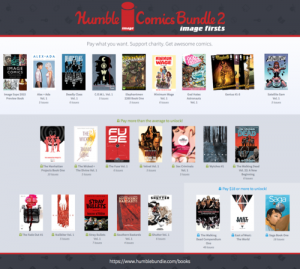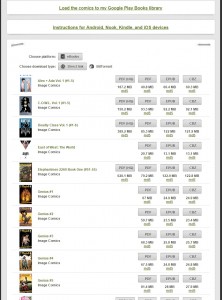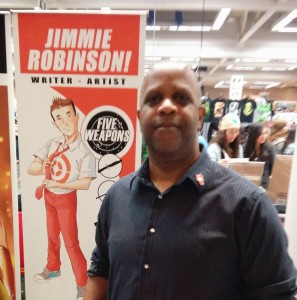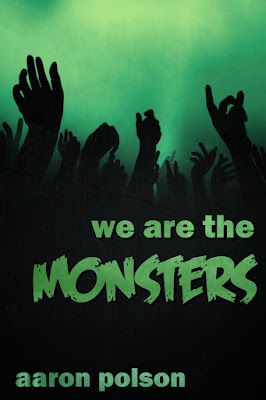
By Bruce Lidl
Lost somewhat in the initial burst of news from last week’s ImageExpo was the announcement of a new Image Humble Bundle offering, beginning that morning and lasting until January 21. The “Humble Image Comics Bundle 2: Image Firsts” is a massive collection of digital comics that can be purchased for whatever price the consumer chooses. Included in the basic bundle are the beginning issues of a number of recent series, including Alex + Ada, Deadly Class, C.O.W.L., Elephantmen 2260 Book One, Minimum Wage, God Hates Astronauts, Genius, and Satellite Sam. Paying at least $15 also gets you the slightly higher profile titles The Manhattan Projects, The Wicked + The Divine, The Fuse, Velvet, Sex Criminals, Wytches, The Walking Dead Vol. 22: A New Beginning (#127-132), The Fade Out #1, Nailbiter, Stray Bullets, Southern Bastards, and Shutter. And finally, a stretch price of $18 brings The Walking Dead Compendium One (#1-48), East of West: The World, and Saga Book One (#1-18). For anybody at all interested in Image brand comics, the price truly cannot be beat, especially as the retail price of the comics would be over $300 according to Humble Bundle. Also, purchasers are strongly encouraged to mark a portion of their price paid towards charity, in this case the comics creator focused Hero Initiative. As of this evening, the Image bundle has generated almost $318,000, with over five days left to go.
The current offering is the third Humble Bundle to include Image titles. The first time Humble Bundle included any digital comics was the Image bundle in April 2014 that generated almost $400,000 revenue in two weeks, with titles including Saga, Walking Dead, Fatale, Invincible and Chew. Image imprint Skybound also did a special Comic-Con Humble Bundle in July 2014 as well, which was almost entirely Kirkman based titles such as The Walking Dead, Invincible, Thief of Thieves, and Super Dinosaur. That bundle alone generated $232,000.
Other comic publishers that have released Humble Bundles since April include Dark Horse, Oni, Dynamite, BOOM!, IDW, Top Shelf and Valiant. According to Kelley Allen, Director of Books for Humble Bundle, comics publishers are eager to work with them, and she has a number of ebook and comics bundles planned in 2015 alongside Humble Bundle’s traditional gaming focused offerings. The average revenue number for the comics based bundles so far has been $288,000 for the 14 day period. According to Allen, non-gaming bundles allow Humble to “break out from their core gaming audience” but from the comics perspective, they can also create “enormous crossover” by getting great comics in front of the very large Humble Bundle community. With a very clearly defined, and devoted, young male demographic, Humble Bundle chooses comics with both a logical appeal, like Transformers, Star Wars and The Walking Dead, but Allen also curates high quality titles that may stretch demographic borders. She “pushed very hard” to include titles like Sex Criminals in the latest Image bundle, trusting the Humble Bundle audience to appreciate an outstanding title, even without prior awareness.

While the Humble Bundles may help expand the reach of digital comics, they are also helping to encourage comics publishers to feel comfortable with forgoing DRM protections for their products. Humble Bundles, regardless of content, gaming or ebooks, do not use Digital Rights Management anti-copying technologies, both for philosophical reasons and from a practical standpoint. As Allen pointed out, why use DRM when the consumer could theoretically decide to purchase the content for one cent in any case? Even Dark Horse, which has been very reluctant to forgo DRM generally, was convinced to try not using it for their big Star Wars themed Humble Bundle in October and was rewarded with sales over $375,000 for the two week offering.
Fundamentally, the Humble Bundle “pay what you want” approach reflects exactly the insights independent game developers have learned over the years in regards to digital sales. Since their products are almost universally available to be pirated, often in formats that are actually *more* user friendly than the official versions, game creators have learned to embrace the concept of giving customers compelling reasons to purchase, in the recognition that they do not have to anymore. Distribution options like Steam and Humble Bundle provide explicit value beyond what a pirated version can give, whether through ease of use, personal connection to the creators, community recognition, charitable giving, etc. The Humble Bundle experiment really leverages the unique potential of digital distribution, as the pay what you want model could not really scale in a system that necessitated fulfillment and postage charges. With this almost “donation” type model there is no extra expense for the seller after the first sale, everything after that is essentially “profit.” And the possibility that the new readers exposed to the material may become fans, and go on to make further purchases, even print purchases in local comic books stores, only heightens the value of the Humble Bundle offering. We are likely to see a number of interesting comics based bundles in 2015 and we will learn if this kind of non-traditional sales can become a significant portion of publishers’ revenue, in much the same way digital has already established itself recently.
By Bruce Lidl

The Sacramento Wizard World convention was an opportunity for comic fans in Northern California to gather and celebrate their passions with other fans and celebrities. It was also a chance for Jimmie Robinson, a veteran Bay Area comic book creator (and frequent commentator at The Beat) to meet his readers and spread the word about his on-going all-ages Image series, Five Weapons. I was curious to get a creator’s insight about this new convention, but we ended up chatting about a variety of topics, so I decided to make a separate article in its own right. As a long-time participant and observer in the comics industry, Jimmie has a great perspective on what is really happening right now, and he was very generous of his time to speak with me on the show floor.
Robinson was quite positive about the Wizard show, the staff, and the vibe around the convention center. Everybody was seemingly happy with the turnout and the enthusiasm of the attendees, especially the local downtown merchants. I was curious to hear how his convention schedule played into his work-time and income, and whether he was seeing the kinds of returns on paid sketches, commissions and appearance fees that some artist superstars like George Perez have experienced. According to Robinson, conventions, even well attended ones like Sacramento Wizard, are not “real money makers” for him, as he still has to pay his expenses, including travel and lodging. The worst thing about conventions for Robinson is not the expense, though, it is the time taken away from his work of actually making comics, something he much prefers to do if possible. In general, he limits himself these days to shows he and his team (wife Gail and dog Eli) can drive to, including the Reno Wizard show and possibly San Diego. For him, conventions remain all about “spreading the word” about his books, particularly Five Weapons, his current title from Image/Shadowline, an all-ages tale of the one pacifist student enrolled at a school for assassins (broken up into 5 weapon-themed houses, kind of a killers’ Hogwarts). He emphasized just how “tough” a sell an all-ages title can be. Currently at issue #7, in the second five issue story arc of the title, he has a commitment from Image to publish a third story arc, taking him through issue #15. Depending on how these story arc sell, he hopes to publish at least through #20, which would complete the initial narrative he conceived for the title.

Eli manning the booth
Robinson was “very appreciative of the huge support” he’s received from Jim Valentino and the Shadowline imprint at Image, particularly with a book that may not be the most marketable. And he “regretted” not being at the January ImageExpo, where the homogeneity of the creators on exhibit was negatively received online. Robinson had only complimentary things to say about his experiences with Image.
While Robinson appreciates the personal outreach opportunities conventions give comic creators, he is also “very enthusiastic” about the growth of digital comics, both from a sales perspective but also from a creative viewpoint. Digital sales of his older Bomb Queen title have been “very good” and he has seen bumps in sales of older issues when new ones come out and re-ignite interest. He is also an outspoken fan of comiXology’s Guided View reading enhancement, although he does struggle somewhat with making sure that his books look good when they are going to be converted to the new format. The process of conversion is quite “mysterious” to Robinson, and he does not have any insight at all into who actually does the work at comiXology, but he’s “very conscious” when he is drawing of what kind of panel layouts work best with the new technology.
His one major criticism of the current digital comics trend is the lack of transparency into the data generated by digital sales, as any data he does get from comiXology is basically limited to royalty statements and is usually “way old, usually from two quarters behind.” He is eager to see if he is able to get quicker and more detailed information from the shift at Image to selling directly and without DRM (Five Weapons #1 is available right now for free in either PDF, EPUB, CBR or CBZ formats). Robinson is “completely for” Image’s move to drop DRM and is generally really excited to see his work available in as many formats as possible. As someone who first heard Scott McCloud talking up online comics way back in the mid-90s, Robinson knows first hand how far the industry has come in expanding distribution avenues for new creators to attract readers. He echoed the message oft repeated today, that the challenge is no longer to “break into comics but to stay in comics!”

It was a pleasure chatting with Robinson and getting his expert viewpoint on a comics industry that offers both unprecedented opportunities and daunting challenges for even well-established creators like himself. And check out Five Weapons and see how good all-age titles really are these days!

I am aware that I am dreadfully behind the times, but the Kindle I wanted finally hit a price point that I felt was worth it and I got one: a Kindle Keyboard 3G/Wifi model. It’s nice. I’ve been tinkering with it. Here are some initial impressions.
1. Now that the Kindle Fire and other fancier ebook readers are out, the older ones are relatively inexpensive. While you can still buy this model new for low three figures, I got it refurbished from ebay for $50 delivered and was happy about it. Didn’t come in an Amazon box. Just showed up in some bubble wrap with a cable. Fine by me and super cheap for worldwide low-end 3G and an “experimental” browser.
2. I am mostly interested in using this when I travel for the free worldwide-ish internet access as well as being able to carry a lot of books with me on a long trip. I still prefer paper books but am at the point where I need to have more working knowledge of ebook readers than I have. We lend them out at the library that I occasionally work at, but that isn’t enough. I am not interested in buying a lot of new books. I am not interested in creating any more of a relationship with Amazon than I already have. I have a loose relationship with copyright laws but that doesn’t mean that you should, necessarily.
3. First step: hacking it so I can do what I want with it. I do not want their default screen savers. I do not want to pay them to convert things to PDF for me. I do not want to only buy things from the store, I don’t really care about the store. I don’t like the blinky page turning effect. A quick google brings me to this page. I follow a few instructions and I have my own screensavers and a jailbroken Kindle. I also read more about the blinky page flashing effect and why it exists (and that the alternative is often ghosting which would drive me crazy) and I’ve decided to stick with the blinky and learn to live with it, even though it’s nice to have options. I am not messing with the default fonts, for now. I am not installing KIF the Kindle interactive fiction interpreter, for now. I am okay that I will miss out on Amazon-only releases, for now.
4. Second step: get some books. As I said, I wanted to see how much I could do with this without involving Amazon. I’m not anti-Amazon so much as I’m just Amazon-agnostic and don’t want to have my device talking to them about me. There are basically three main ways to get books on to the thing: buy them, steal/borrow them, create them.
As much as I love the DIY Scanner idea, it’s a ways off for me. So I’m going to focus on the middle option.
First option: I went to Listen Up Vermont and gritted my teeth through the terrible interface (which I hear is changing), found a book I wanted to read, went to check it out, tried three different library cards until I got one that worked. Then got to the Amazon page and had to log in there as well. Did not want to register my Kindle. My only option at that point was to read the book in the “cloud reader” [i.e. on their website]. Okay. No way to download a book without becoming an Amazon customer. I’m sure this is not news to anyone who has a Kindle, but I hadn’t really tried this all out yet. This whole process took far too long.
Second option: Open Library. Found a book I wanted to read. “Checked it out” via Open Library’s nifty checkout options. Not even sure which library card I used, maybe it was just me being in the state of Vermont. Checked out the PDF of the book. Downloaded it to my desktop via Adobe Digital Editions which did not require me to register for an account but did have less functionality if I didn’t register which seemed okay to me. Could read it on my desktop. Was prohibited because of DRM from reading it on my Kindle. In the interests of science I tried to figure out how to get this to work anyhow. Spent a lot of time on this website reading about Calibre and the DRM and ebooks generally. Don’t let the post dates fool you, this is a fairly up to date blog. Calibre is a great ebook management tool that follows in the steps of some other open source tools in that it doesn’t break DRM itself, but you can obtain plug-ins that will do the DRM-breaking if you want. It also does a lot of other great things like allowing you to edit ebook metadata and group and organize your ebook collection. You can also use Calibre to format-shift your ebooks to and from various formats. I took the DRM off this ebook and then moved it to my Kindle. It’s not so great to read there because it’s in PDF format but it was good for proof of concept. 500 page PDFs are just not awesome for reading.
Third option: piracy. Most of the time if you search for a reasonably popular book using the title and other words like “mobi” or “epub” you can find forums where people upload pirated copies of these books to filesharing sites like divshare or mediafire. It’s worth noting that the Apprentice Alf website that helps you break DRM explicitly says that breaking DRM to upload books to piracy sites is an explicitly uncool use of DRM end-running which is the position I agree with for the most part. I tried the pirate download options with a book I already had in hard copy and found not just that book but a bundle of five other books by the same author. Downloaded, unrar-ed drag-and-dropped to my Kindle. Started reading. No passwords. No failures.
And as far as the reading experience, I’ve taken to it much more quickly than I thought I would. This is, of course, what everyone but me thought would happen. The Kindle is light, the back-forth buttons are simple and not accidentally clicked. I like being able to look up words in a dictionary without moving more than a few fingers. I like that it knows where I left off. I like getting to toss a book out when I am done with it. All in all my conclusions are much like the ones I was nodding my head with at the In Re: Books conference. Ebooks readers are great and improving all the time. It’s the ebooks themselves–the DRM, the bad user experience, the complicated and wonky checkout procedures, the lack of privacy, the changing restrictions we deal with as libraries, the terrible websites our vendors create–that are not just suboptimal but at the center of a bad user experience that we’re in the awkward position of promoting as if it were our own.
So, mixed feelings of course. I’ve gone to bed and read my Kindle most nights this week and enjoy it. I still can’t look a patron in the eye and explain that they need to go through a bunch of bad websites, log in at least twice and create relationships with multiple vendors who are not the library in order to check out a book from us. Here’s hoping the landscape will change for the better. Here’s suggesting we do what we can to help that happen.
Panel at #ala2009
Jason Griffey, Eli Neiburger, Tom Peters, Bonnie Tijerina, Deborah Caldwell-Stone
Jason: Overview of the Mobile World
numbers (because this arena is very important for us)
4,100,000,000 number of mobile phone subscriptions in the world
over 60% of the people on earth have a mobile phone subscription service
in 50 different countries around the world, the number of cellphones per person exceeds 100%
(means more than one cellphone each)
not just places like Korea, but places like Gambia, wehre 1,000,000 people have access to a telephone, and only 50,000 of those are fixed landlines
90% of the world’s population will have access to a cell phone signal by the end of 2010
2,400,000,000 people using SMS (active users)
75% of the people who have data access on their phones
we’re not good at handling numbers, but 1,200,000 people use email, so twice as many using text messages
2.3 trillion text messages sent in 2008
20% growth curve over 2007
so we have hard numbers that show this is the single most popular way in which the world accesses data
SMS is the largest data access method of communication/access in the world
showed the Wired Smart Guide for smartphones - iPhone, G1, Pre, Storm
we do often think about people accessing our information on smartphones, but there’s also a multitude of other data access devices with different models from cell phones:
- Kindles, buy content with no monthly charges
- netbooks with cell radios built into them (get device free but pay monthly data charges)
- Verizon MiFi, projects a wifi field for you, acts as a router to the cell network for ubiquitous connectivity
future:
most areas of the U.S. have some cell network access
what we have now is child’s play (kindergarten), but in 3-5 years will be Harvard
LTE (Long Term Evolution) - next generation
current network is fast enough for text, but not for video streaming
LTE promises the video streaming
with those kinds of things, we’ll see things we can’t even imagine right now
this is not science fiction; Rogers has promised this will be available in Canada by the end of 2010, AT&T in 2011
Honeywell Kitchen Computer for 1969, for sale by Neiman Marcus during the Christmas season
$10,000 and weighed 100 pounds, had to go to programming school for two weeks to learn how to make it work
didn’t sell a single one
in 1969, they had the capacity to build the device, but the best idea they had was to make it a kitchen recipe machine (”if it plus in, it must be an appliance” - Eli)
mobile devices are just now becoming robust enough to be transformative
the early vision for a device is rarely the way it actually transforms the world
Henry Ford: “if I’d asked them what they wanted, they would have told me a faster horse”
someone has to flip the switch and change things, and we’re very close to that for mobile devices
Clay Shirky - “the tools don’t get socially interesting until the tools get technically boring”
we’re right at that cusp
problems in the mobile world:
(bike that only rides on roads specially designed for it)
1. copyright
2. DRM
as we move from text into robust apps we can’t even envision yet, it’s important to enable these things, not prevent them
Tom: doesn’t want to underestimate the adoption of cell phones; can’t think of another man-made, manufactured device that’s been adopted by 60% of the world in a matter of months
surpassed toilets? are cell phones more recognizable than paper?
huge in the history of mankind
Panel
Question for Eli: when we talk about mobile devices, we mean digital content. is it a given we’re moving towards this licensing model for digital content, when libraries have traditionally purchased “things” and lending them under first sale doctrine? how do libraries maintain their rights under these threats of DMCA, etc.
Eli: this is really THE question for libraries in the 21st century; holding something of a copy that exists in 10,000 places in the world is worthless - that’s not the value; you have the whole world in your pocket
the rest of the world has skipped the 20th century and gone straight to the 21st; we no longer provide value by providing a copy of something that exists elsewhere
it’s what doesn’t exist anywhere else, which means creating it, which is usually letting your patrons create that
no longer bringing the world to your community, but bringing your community to the world and making it accessible
you’re (the library) the only one that cares about that content being out there
possible future where DRM triumphs & RIAA, etc. get everything they ever wanted and there’s no room for libraries
but could have an uprising against copyright and everything being free to everyone, although this is equally dangerous to libraries
will come down to digital ownership of rights
important not to forget that a major role of the library is to aggregate the buying power of the community and provide access
best thing we can do is produce and assist in the creation of new knowledge
don’t want to get involved in the DRM nightmare and find a value proposition that is meaningful to users in the networked 21st century
Bonnie: agrees and thinks that’s where we’re going, but still have issues now about what we’re licensing and getting
libraries are known as being stewards; need to be thinking now about issues of providing access to content
agrees the future is more about making our collections and knowledge more accessible
Tom: who’s going to take on stewardship in perpetuity? a trust organization?
Question for Bonnie: libraries want to accommodate user expectations for mobile devices, how does the “mobile” change the traditional library service model?
Bonnie: are mobile technologies really changing the core and the values of what libraries provide?
when I think of our service models, it’s providing information they need when they need it where they need it
could be answering a question or access to a special collection
the “when” and “where” can now expand, but our core library service model changing as much as the tools we’re using can just expand those services beyond where we’ve done that before
need a willingness to experiment, even with tight budgets (which are the perfect opportunity to do this)
need a willingness to do more collaborative work, which is getting easier
need to talk to the users more and assess their needs
Jason: one of the things he’s been thinking about lately regarding services and mobility (and the new web) is that a lot of our info flow and communication is moving to a real-time communication river
we wish they used libraries in this way, using human filters in real-time
thinking about “proactive reference” - especially for localized situations
we’re going to need to be putting ourselves in that flow
pulling questions out of that flow and answering them, not waiting for them to come to us
they’re getting answers from peers, so we need to insert ourselves in as experts and guide that flow
this could be a real growth area for libraries
Question for Tom: with future, pervasive networking, how will library services change and what are the implications for privacy and bandwidth-planning?
Tom: he manages a downloadable ebook library project, so he looks at it through that lens
your access depends on your network connection
how do you get it to your ears?
the future is streaming media, not downloadable
already have “Tumble Talking Books,” which is a streaming audio service that has expanded beyond kids
storage costs? although approaching zero and can keep everything
big issue is battery life, which hasn’t really improved much
it’s the achilles heel in this scenario
he assumes bandwidth will be there when he needs it, although his options at home are limited; this will change
we’ve thought about information as physical objects (books, copies, holding something)
as we get more into streaming media, our thinking will change to information experience
we’ve always talked about a “good read” - it’s a mix between the object and the experience, but the experience will take on a much bigger role
eg, there are some really interesting information experiences in the virtual world, such as books you walk into, contribute to just by experiencing it
libraries haven’t had a good way to measure usage, so we use surrogate measures (walked in the library, but don’t know what they did there - doesn’t mean they “used” the library)
in a world of streaming media, you could say they only streamed “war and peace” for five minutes, which means they probably didn’t read the whole thing
will get closer to knowing how they use these resources, which raises privacy issues
Question to Deborah: when have granular data collection and partner more with third-party content owners, have scenarios like Google Books knowing which page you’re on; a few services have more protections than libraries; how can libraries evolve in this space and work with these vendors?
Deborah: the first thing libraries have to keep in the forefront is giving users the choice of how their data is handled, which means giving them full information, which means the library has to do due diligence on these issues
if you have to expose some kind of ID to get access to this information, how is that handled?
have to address who owns the personally-identifiable information that gets transmitted? it should be the library
insist on the highest level
in an ideal world, it would be one-time use and then the data is discarded
good policy says you only keep it for as long as you need it and then you discard it
make sure the third party isn’t mining that data
on the larger level, need to discuss what privacy means in the first place
we’re stewards for our users; we can’t assume permission where it’s not given
it’s fine for an individual to decide to expose information, but they have to know enough information to make an informed decision
if I don’t want to use streaming media, can I get a download?
Tom: InfoQuest project is going to offer 24/7 SMS text reference and the issue of privacy has come up
user will text them a question that comes in through Google, and the librarians can see the cell phone number
have two outside entities involved - Altarama and Google
as soon as they answer the question, they’ll delete the email
for info purposes, they’ll save the questions in the backend without personal data
Deborah: sometimes, we shouldn’t do something just because we can
Bonnie: in an environment where people are choosing their level of privacy, and some are allowing more than others, a better role for libraries might be educating users about what they’re giving up
privacy is not dead, but that decisions about privacy have gone into the hands of the user more than ever before
is our role then to help provide information to let them know what info they’re giving up instead of not providing access to these services that have risks?
Deborah: opt-in is the way to go; respect user choices
Eli: it goes even further than that, because there is no way to assure your patron’s data if you enter into a relationship with a vendor
the more that you do in-house, the better
most services will let you authenticate in-house and then pass the user to the vendor anonymously
if you’re using google analytics, you’re piping every hit through google, and they haven’t really been tested
the work of the 21st century for libraries is to make these resources owned and developed by the library, not making contracts for $20,000 to do something you could do in-house
we’re addicted to vendors
there are a lot of products on the exhibit floor that could be done by a good programmer in-house in two weeks, and privacy is a big motivator to do this
Question for Jason: DRM has been vilified, but some point out that DRM on digital library content is more aligned with the traditional model of library service; what are the drawbacks for users?
Jason: treating digital like physical is insanity of the highest order, and the fact that we’re still using that model is ridiculous
the music industry was the first to be utterly destroyed and rebuilt (Napster –> iTunes, which is now DRM free)
if the other industries don’t see this and change their paths, they’ll just have to be destroyed and rebuilt
this feeds into something else about content that we’re not paying enough attention to, that libraries subsidize the purchasing of the information and distribute it for free
digital drives everything to free - as storage and processing becomes cheaper and everything goes digital, the price point moves to free
you’ll pay for advertising, but the cost for obtaining that content is driving down to zero
the other thing we’re competing with, besides cost coming down to zero, is piracy
if it’s easier to get a pirated copy of a book they can do whatever they want with, they’ll do that
can’t compete with free, so need to compete with easy; need to be easier than piracy
iTunes became #1 music store in the country was not because it was DRM-free, but because it was easy
we don’t even allow sharing digital content between ourselves, let alone our patrons
he could go online now and get any NYT bestseller in 30-40 seconds
mobile devices accelerate that, as do peer-to-peer networks
DRM will destroy libraries if we allow it, and it will be very difficult for us to overcome in the next 3-5 years
Tom: completely agrees
digital networks allow you to make an unlimited number of perfect copies at the speed of light for a fraction of the cost
we’re working through the economic and legal ramifications of that fact
can’t deny this forever
we’ve hitched the notion of intellectual property to the wrong horse, the making of copies
made sense when it was hard to make copies, but now it’s easy (brainless)
need to rebuild intellectual property from the ground up so that it’s not about slapping people on the wrist
Eli: right now the copyright landscape is driven more by copyright holders’ fear
iTunes bridged the users and the copyright holders
the horse is still with us, but he’s still in the backseat, riding along with us because we’re bringing him with us
when you think about the people in charge at major labels right now, there’s a finite supply of them
the kids who went crazy with Napster will have a very different way of looking at the business model
research shows that giving stuff away for free drives sales
there are producers making more money giving content away than they did selling it
part of the problem with the Kindle is that they’re still charging hardcover book prices - imagine if the price of a book was $1 - no one is comfortable with that model yet
Question for the panel: there are obvious policy considerations - accessibility, special user groups; how can libraries continue to advocate for these users in a mobile environments?
Tom: thinks we need a reader bill of rights for the digital era
give the reader the right to choose the font, color, font size, etc., but it’s the readers right, not anyone else’s
the ability to turn any etext into a text-to-speech should be an inalienable right
blind & visually-handicapped users are tearing their hair out about the Amazon turning off TTS on the Kindle because of the author/publisher lobby because removed thousands of titles from their grasp
* this is an area where ALA could help
Jason: is going to take the opposite tact
it’s not Amazon that turns off the TTS - it’s the publishers at the book level (doesn’t like that Amazon gave that ability, but the publishers are making this a problem for these blind users)
collectively, we could make a statement by aggregating our buying power since we spend *thousands* of dollars with publishers every day
could organize an effort
Eli: at the same time, there are publishers who would say “fantastic, the library won’t be purchasing our content anymore”
OverDrive is a good example - not offer it because of some high falutin’ concept?
exert the pressure on vendors - we would pay more if you’d open this up - show them the value of opening up the content
there are market opportunities to get around these issues in many of the areas where libraries work with others on standards
iTunes made it okay by showing people would pay more for open content
Tom: libraries are a fraction of the buyers in the print book market, but we’re a much larger share in the audio market (30%)
we do have more clout there
Question from the audience: asked about the “sixth sense” device shown off by MIT
a mobile computing device with a camera that is smart enough to recognize objects and layer information over it - “augmented reality”
potential to attach reviews to books
displays the Amazon rating right on the book and whether you can get it somewhere else cheaper (whether your library has it)
Jason: there are a few different projects experimenting with augmented reality on the new iPhone
interesting one that overlays historical information over buildings
in general, libraries are the entities that have that information
Tom: a low-tech way to do that now is with QR Codes
Eli: what’s interesting about the sixth sense project is that it’s a transitory project
it’s for visitors, not those who live in the 21st century
in the future, it won’t be about decoding the objects
read Vernor Vinge’s “Rainbow’s End” about wearable computers and libraries
one of the first uses of the telephone was supposed to be piping music into peoples’ homes
someday, the Kindle will look like a joke - it’s important right now, but it’s just a step on the journey
Question from audience: what kinds of questions should we be asking about format? if we try to make our information accessible for special populations, will that meet our mobile needs?
Tom: accessibility benefits everyone
it’s very sad that most portable devices are operated by buttons, and somewhere along the line, buttons got turned over to marketers, not engineers - they’re not accessible anymore and they’re designed for the young
this is madness - our portable devices should be accessible to everyone
it’s a tragedy
Eli: the emergence of web standards is the best thing that ever happened to the accessibility community
if you’re stuff is standards-compliant, it will be accessible
the term “mobile web” is a transitive one, because what you have in your pocket is “the web”
it won’t be about special interfaces
text has become electronic, which has completely helped them
the economics of Braille don’t work, but the right platform and technology makes everything accessible
most of the accommodations necessary are in the standards
Jason: agrees
part of the problem is that we don’t have a standard ebook format
epub is the closest we have (behind HTML, which the publishers aren’t using)
as long as we stick with a standard, you can move from device to device (that’s why MP3 works so well)
haven’t gotten there with video yet
HTML 5 is falling apart because of video codec arguments
stick with known, published standards, which make accessibility easier
Eli: the industrial revolution truly began when people could make standard parts that worked together
the same thing is starting to happen with information
those who are succeeding are doing so because they’re embracing open standards
wouldn’t want a car you can only put one type of tire on
Question from audience: is Creative Commons licensing the way things are going?
Jason: thinks CC is a very important starting point, especially for library-created content
need to allow for sharing
there’s still a lot of work to be done with copyright law
we’re done with copyright law in a way that’s great for the 20th century
Eli: CC is the best hope and compromise we have right now
any legal team is going to say it makes them uncomfortable, but they should be able to live with it
sees libraries putting copyright on content they’ve digitized that was previously in the public domain
hopefully someday we won’t need it though
Bonnie: agrees, it’s a stepping stone
Eli: part of the challenge is that you still see a lot of creators, especially hobbyists, who look at copyright as the thing that will make them rich
most people receive very small amounts of money from copyright
it’s more how your ideas live, not wither on the vine
Jason: the challenge to creators in the 21st century isn’t piracy, it’s people not having any idea who the hell you are
CC gives people the chance to find out who you are and give you money
libraries should be using CC
Bonnie: works with a lot of scientists, scholars, etc. and talks to them about CC in terms of permissions they don’t get from others so that they’ll use it to make it easier for others

















Tags:
#ala2009,
cellphones,
copyright,
DRM,
libraries,
mobile,
policy





























Really a great crop this time around; I bought in on the middle tier (because I’m between jobs and I’ve already got Saga and The Walking Dead) and I’m finding Sex Criminals and The Wicked + The Divine to be just as good as everyone’s been saying.
Not only that, but Image knows what it’s doing in terms of file compression. I’ve bought Humble Bundles from other publishers in the past that were either ridiculously-oversized, hope-you-weren’t-planning-on-storing-anything-but-Transformers-comics-on-your-tablet PDF files or low-resolution, heavily-artifacted CBZ’s; I found this to be the case on bundles from IDW, Boom, and initially Valiant, though Valiant later replaced the low-quality CBZ files with much better ones. I’ve never had a problem with Image’s digital comics; they know the Goldilocks point between filesize and quality.